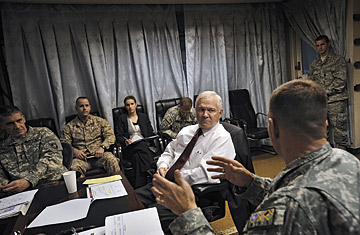
Gates being briefed at Camp Eggers in Kabul during a tour of Afghanistan last December.
(4 of 12)
It was not the best few days for Gates. At the Arg Palace in Kabul, Afghan President Hamid Karzai told Afghan and foreign journalists that the country's security forces would be dependent on the U.S. for at least 15 years. Gates stared stonily at the floor in front of him, then politely corrected the Afghan President. A few days later in the New York Times, Maureen Dowd lamented that puppets just aren't what they used to be.
With nowhere to go, Gates was given an impromptu tour at the airport by his former military adviser General David Rodriguez, now No. 2 to General Stanley McChrystal, the top U.S. commander in Afghanistan. He ushered Gates through a hangar outfitted as NATO's new cyber-command-and-control center. One of his staff whispered, "An enormous well-oiled machine for eatin' bad guys." In another hangar, Gates got a glimpse of the fledgling Afghan air force and stepped into the cockpit of an old Russian Mi-17 attack helicopter. "Don't you love the irony of Gates in the pilot's seat of an Mi-17 that he was getting Stingers to shoot down?" said his spokesman Geoff Morrell.
Today Gates is fighting to buy more of those Russian helicopters, considered the Kalashnikovs of the sky. The Iraqis and Afghans are familiar with them. They're hardy and easier to fly than Black Hawks, and their engines are better at handling the tough Afghan altitudes.
The symbolism of Gates employing the very machines left behind by the Soviets is more unsettling than ironic. Before finally throwing his support behind McChrystal's push for a troop surge late last year, Gates repeatedly warned that even the Soviets could not win with 110,000 troops in Afghanistan. Gates should know, since he was one of the reasons the Soviets failed. As deputy director of intelligence at the CIA in the 1980s, he signed off on the decision to ramp up U.S. aid to the mujahedin, including the supply of Stinger antiaircraft missiles. Gates plotted with President Mohammed Zia ul-Haq of Pakistan and toured the mujahedin camps, befriending some of the guerrilla leaders who now live in Pakistan's tribal regions and dispatch suicide bombers to blow up American and Afghan forces. Ex--CIA officer Milt Bearden recalls crowds shouting "Allahu akbar" (God is great) in honor of Gates. Afghans who fought the Soviets still refer to him as "General Gates."
In that Russian cockpit, however, Gates looked less like the pilot of the world's most powerful military machine and more like a man in a bubble. Does he worry that he'll end up like the Soviet generals he once fought against, steering a strategy that ends in defeat?
Gates replied, "That's like going back and saying, 'If you'd known the mujahedin would morph into what they became, would you have supported them against the Soviet Union?' My view is, having done this for a long, long time, you never know. You make the best call you can with the information and judgment you have."
